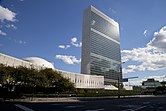
Back Globalisering Afrikaans Globalisierung ALS Globalización AN عولمة Arabic গোলকীকৰণ Assamese Globalización AST Qloballaşma Azerbaijani کورهسللشمه AZB Глобалләшеү Bashkir Gluobalėzacėjė BAT-SMG
| Part of a series on |
| Sociology |
|---|
 |
Globalization (North American spelling; also Oxford spelling [UK]) or globalisation (non-Oxford British spelling; see spelling differences) is the process of interaction and integration among people, companies, and governments worldwide.[1] The term globalization first appeared in the early 20th century (supplanting an earlier French term mondialisation), developed its current meaning sometime in the second half of the 20th century, and came into popular use in the 1990s to describe the unprecedented international connectivity of the post–Cold War world.[2] Its origins can be traced back to 18th and 19th centuries due to advances in transportation and communications technology. This increase in global interactions has caused a growth in international trade and the exchange of ideas, beliefs, and culture. Globalization is primarily an economic process of interaction and integration that is associated with social and cultural aspects. However, disputes and international diplomacy are also large parts of the history of globalization, and of modern globalization.
Economically, globalization involves goods, services, data, technology, and the economic resources of capital.[3] The expansion of global markets liberalizes the economic activities of the exchange of goods and funds. Removal of cross-border trade barriers has made the formation of global markets more feasible.[4] Advances in transportation, like the steam locomotive, steamship, jet engine, and container ships, and developments in telecommunication infrastructure such as the telegraph, the Internet, mobile phones, and smartphones, have been major factors in globalization and have generated further interdependence of economic and cultural activities around the globe.[5][6][7]
Though many scholars place the origins of globalization in modern times, others trace its history to long before the European Age of Discovery and voyages to the New World, and some even to the third millennium BCE.[8] Large-scale globalization began in the 1820s, and in the late 19th century and early 20th century drove a rapid expansion in the connectivity of the world's economies and cultures.[9] The term global city was subsequently popularized by sociologist Saskia Sassen in her work The Global City: New York, London, Tokyo (1991).[10]
In 2000, the International Monetary Fund (IMF) identified four basic aspects of globalization: trade and transactions, capital and investment movements, migration and movement of people, and the dissemination of knowledge.[11] Globalizing processes affect and are affected by business and work organization, economics, sociocultural resources, and the natural environment. Academic literature commonly divides globalization into three major areas: economic globalization, cultural globalization, and political globalization.[12]
Proponents of globalization point to economic growth and broader societal development as benefits, while opponents claim globalizing processes are detrimental to social well-being due to ethnocentrism, environmental consequences, and other potential drawbacks.[13][14]
Between 1990 and 2010, globalisation progressed rapidly, driven by the information and communication technology revolution that lowered communication costs, along with trade liberalisation and the shift of manufacturing operations to emerging economies (particularly China). [15][16][17]
- ^ Scholte, Jan Aart (2008). "Defining Globalisation". The World Economy. 31 (11): 1471–1502. doi:10.1111/j.1467-9701.2007.01019.x.
- ^ James, Paul; Steger, Manfred B. (2014). "A Genealogy of globalization: The career of a concept". Globalizations. 11 (4): 417–34. Bibcode:2014Glob...11..417J. doi:10.1080/14747731.2014.951186. ISSN 1474-7731. S2CID 18739651.
- ^ Albrow, Martin; King, Elizabeth (1990). Globalization, Knowledge and Society. London: Sage. ISBN 0-8039-8323-9. OCLC 22593547.
- ^ Read "Following the Money: U.S. Finance in the World Economy" at NAP.edu. 1995. doi:10.17226/2134. ISBN 978-0-309-04883-5.
- ^ "Imagining the Internet". History of Information Technologies. Elon University School of Communications. Archived from the original on 23 March 2009. Retrieved 17 August 2009.
- ^ Stever, H. Guyford (1972). "Science, Systems, and Society". Journal of Cybernetics. 2 (3): 1–3. doi:10.1080/01969727208542909.
- ^ Wolf, Martin (September 2014). "Shaping Globalization" (PDF). Finance & Development. 51 (3). International Monetary Fund: 22–25. Archived (PDF) from the original on 22 September 2018. Retrieved 10 August 2015.
- ^ Cite error: The named reference
GL-H-09was invoked but never defined (see the help page). - ^ H., O'Rourke, Kevin; G., Williamson, Jeffrey (1 April 2002). "When did globalisation begin?". European Review of Economic History. 6 (1): 23–50. doi:10.1017/S1361491602000023. ISSN 1361-4916. S2CID 15767303.
{{cite journal}}: CS1 maint: multiple names: authors list (link) - ^ Sassen, Saskia - The Global City: New York, London, Tokyo. Archived 16 March 2015 at the Wayback Machine (1991) – Princeton University Press. ISBN 0-691-07063-6
- ^ "Globalization: Threat or Opportunity?". International Monetary Fund. 12 April 2000. Archived from the original on 18 August 2017. Retrieved 28 November 2019.
- ^ Babones, Salvatore (2008). "Studying Globalization: Methodological Issues". In Ritzer, George (ed.). The Blackwell Companion to Globalization. Malden: John Wiley & Sons. p. 146. ISBN 978-0-470-76642-2. OCLC 232611725.
- ^ "6 Pros and Cons of Globalization in Business to Consider". Business Insights Blog. 1 April 2021. Retrieved 4 September 2024.
- ^ "Weighing the Pros and Cons of Globalization | Wilson Center". www.wilsoncenter.org. Retrieved 4 September 2024.
- ^ Bank, European Investment (3 October 2024). Navigating supply chain disruptions: New insights into the resilience and transformation of EU firms. European Investment Bank. ISBN 978-92-861-5807-0.
- ^ "Globalisation, automation and the history of work: Looking back to understand the future". UNCTAD.
- ^ "Global Trade Liberalization and the Developing Countries -- An IMF Issues Brief". www.imf.org. Retrieved 10 October 2024.




